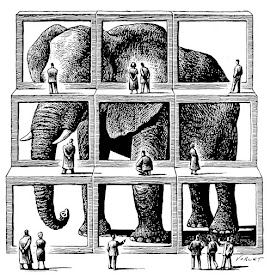Week 10 - Class Lecture Review - Cross-Cultural Servanthood - Dr. Duane Elmer
Dr. Duane Elmer, a globally recognized educator and author, presented a transformative series of lectures on cross-cultural servanthood. With extensive experience teaching in over 75 countries and training leaders across corporate, nonprofit, and mission contexts, Dr. Elmer offered profound insights into the role of cultural awareness, humility, and relational intelligence in serving others effectively and reflecting Christ’s love.
Dr. Elmer’s lectures tackled the complexities of cross-cultural relationships, emphasizing the importance of understanding and respecting differences. He explained that cultural misunderstandings often arise not from malice but from ignorance or deeply ingrained assumptions. His challenge to move beyond tolerating differences to truly understanding them underscored the necessity of empathy for meaningful service.
One of the foundational ideas was his statement, “You cannot serve someone you do not understand; at best, you can only be a benevolent oppressor.” This idea set the tone for the discussions, illustrating the risks of well-intentioned but uninformed actions. The parable of the monkey and the fish served as a vivid metaphor for the consequences of imposing one’s own solutions without considering others' needs or contexts.
A recurring theme was the importance of identifying and respecting cultural value orientations. Dr. Elmer explained how our default behaviors—what we perceive as “normal”—are shaped by our cultural values. He emphasized that effective cross-cultural engagement requires an intentional effort to recognize and adapt to these differences.
Days 4 and 5 expanded on these ideas with a focus on conflict management and communication styles. Dr. Elmer explored the root causes of conflict, such as unresolved anger, miscommunication, and “negative attribution”—the tendency to assign negative motives to others in moments of confusion. He emphasized relational intelligence and humility as tools for bridging divides rather than deepening them.
Day 4 featured an exploration of conflict in cross-cultural settings. Dr. Elmer presented hypothetical scenarios that highlighted how differing cultural value systems shape conflict resolution approaches. For example, we discussed how hierarchical cultures might prioritize harmony and indirect communication, whereas egalitarian cultures might lean toward direct confrontation. This exercise emphasized that effective conflict management begins with understanding the other person’s perspective rather than imposing one’s own.
On Day 5, Dr. Elmer introduced the Communication Value Orientation (CVO) assessment, a tool designed to reveal the underlying values driving our communication styles. Each student completed a worksheet with paired items, revealing their dominant communication tendencies. Dr. Elmer guided us through interpreting our results, encouraging reflection on both strengths and limitations.
The discussions that followed were lively and eye-opening. For instance, action-oriented communicators—those who value efficiency and decision-making—recognized their tendency to struggle in collaborative, process-oriented cultures. Conversely, relational communicators—those who prioritize harmony and consensus—acknowledged their difficulty addressing conflict directly. These realizations underscored the importance of adaptability and self-awareness in navigating cross-cultural interactions.
These exercises bridged theory and practice, equipping us with practical tools to engage others with greater empathy and understanding. They also highlighted how cultural differences manifest in everyday communication and how even minor assumptions can lead to significant misunderstandings.
Dr. Elmer’s lectures and exercises were transformative, reshaping my approach to relationships and communication. The idea that “understanding is the basis of care” resonated deeply, reminding me that empathy requires active listening and a willingness to adapt. The exploration of unresolved anger as a root cause of conflict also struck a chord, encouraging me to reflect on my own emotional responses and the importance of forgiveness in fostering reconciliation.
The personal anecdotes Dr. Elmer shared, such as the story of giving snow tires to his wife as an anniversary gift, added humor and relatability to the lessons. These stories illustrated how cultural assumptions influence our actions, often in ways we don’t realize. This reflection challenged me to examine my own biases and recognize that my “normal” might not align with others’ realities.
Dr. Elmer’s lectures offered a profound exploration of what it means to serve others with humility and understanding. The interactive exercises, such as the conflict scenarios and CVO assessment, provided practical frameworks for applying these lessons to real-world contexts.
These sessions challenged me to embrace a posture of curiosity, empathy, and relational humility. They reminded me that effective service is not about imposing my own solutions but about walking alongside others, seeking to understand their needs and perspectives. As I reflect on these teachings, I feel better equipped to navigate the complexities of cross-cultural relationships and embody Christ’s love in a world marked by diversity and difference.
As Dr. Elmer aptly concluded, “If we leave this class unchanged, then it will have been a failure.” His lessons have undoubtedly left a lasting mark, reshaping how I view communication, conflict, and the call to serve others with grace and understanding.
One of the foundational ideas was his statement, “You cannot serve someone you do not understand; at best, you can only be a benevolent oppressor.” This idea set the tone for the discussions, illustrating the risks of well-intentioned but uninformed actions. The parable of the monkey and the fish served as a vivid metaphor for the consequences of imposing one’s own solutions without considering others' needs or contexts.
A recurring theme was the importance of identifying and respecting cultural value orientations. Dr. Elmer explained how our default behaviors—what we perceive as “normal”—are shaped by our cultural values. He emphasized that effective cross-cultural engagement requires an intentional effort to recognize and adapt to these differences.
Days 4 and 5 expanded on these ideas with a focus on conflict management and communication styles. Dr. Elmer explored the root causes of conflict, such as unresolved anger, miscommunication, and “negative attribution”—the tendency to assign negative motives to others in moments of confusion. He emphasized relational intelligence and humility as tools for bridging divides rather than deepening them.
Day 4 featured an exploration of conflict in cross-cultural settings. Dr. Elmer presented hypothetical scenarios that highlighted how differing cultural value systems shape conflict resolution approaches. For example, we discussed how hierarchical cultures might prioritize harmony and indirect communication, whereas egalitarian cultures might lean toward direct confrontation. This exercise emphasized that effective conflict management begins with understanding the other person’s perspective rather than imposing one’s own.
On Day 5, Dr. Elmer introduced the Communication Value Orientation (CVO) assessment, a tool designed to reveal the underlying values driving our communication styles. Each student completed a worksheet with paired items, revealing their dominant communication tendencies. Dr. Elmer guided us through interpreting our results, encouraging reflection on both strengths and limitations.
The discussions that followed were lively and eye-opening. For instance, action-oriented communicators—those who value efficiency and decision-making—recognized their tendency to struggle in collaborative, process-oriented cultures. Conversely, relational communicators—those who prioritize harmony and consensus—acknowledged their difficulty addressing conflict directly. These realizations underscored the importance of adaptability and self-awareness in navigating cross-cultural interactions.
These exercises bridged theory and practice, equipping us with practical tools to engage others with greater empathy and understanding. They also highlighted how cultural differences manifest in everyday communication and how even minor assumptions can lead to significant misunderstandings.
Dr. Elmer’s lectures and exercises were transformative, reshaping my approach to relationships and communication. The idea that “understanding is the basis of care” resonated deeply, reminding me that empathy requires active listening and a willingness to adapt. The exploration of unresolved anger as a root cause of conflict also struck a chord, encouraging me to reflect on my own emotional responses and the importance of forgiveness in fostering reconciliation.
The personal anecdotes Dr. Elmer shared, such as the story of giving snow tires to his wife as an anniversary gift, added humor and relatability to the lessons. These stories illustrated how cultural assumptions influence our actions, often in ways we don’t realize. This reflection challenged me to examine my own biases and recognize that my “normal” might not align with others’ realities.
Dr. Elmer’s lectures offered a profound exploration of what it means to serve others with humility and understanding. The interactive exercises, such as the conflict scenarios and CVO assessment, provided practical frameworks for applying these lessons to real-world contexts.
These sessions challenged me to embrace a posture of curiosity, empathy, and relational humility. They reminded me that effective service is not about imposing my own solutions but about walking alongside others, seeking to understand their needs and perspectives. As I reflect on these teachings, I feel better equipped to navigate the complexities of cross-cultural relationships and embody Christ’s love in a world marked by diversity and difference.
As Dr. Elmer aptly concluded, “If we leave this class unchanged, then it will have been a failure.” His lessons have undoubtedly left a lasting mark, reshaping how I view communication, conflict, and the call to serve others with grace and understanding.









Comments
Post a Comment